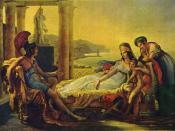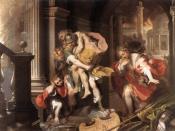It is obvious that there are numerous qualities that make up a hero in BCE Roman culture. However, the quality that stands out against all others is the virtue of pietas, or devotion to duty. Virgil, quite possibly Rome's greatest poet, exhibited this devotion to duty in the writing of The Aenid. Virgil devoted the last ten years of his life to the story of the hero, Aenas, and his long adventure back to Rome. Even after a ten years of making this great epic, he wished it to be burned because it did not meet his criteria for publishing (Overfeild, 139). This action alone shows the reader that Virgil's devotion to duty was tremendous. Luckily, the epic was not burned and readers can now see the virtue of pietas in the warrior-hero Aeneas.
In Aeneas long journey back to Rome, he enters the underworld to consult the spirit of his father, Anchises. His father, whose "face was drenched with copious amounts of tears" (Overfeild, 140), was obviously ecstatic seeing the face of his son. However, Aeneas would have none of it. He was there for a reason and did not wish sympathize with his father. Three times his father attempted to hug him and three times Aeneas "escaped out his hands like weightless winds" (Overfield, 140). Through this, the reader can see Aeneas harsh sense of duty which gave him his heroic elements.
The concept of 'destiny' is present in numerous parts of the epic. Through the reading, one can fully grasp the concept of what 'destiny' meant to the Roman culture. The Romans believed that each persons destiny was predetermined even before the spirit entered the human world. This concept is present throughout the story. For example, after telling Aeneas about the souls yearning for the...


